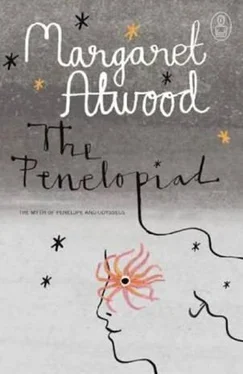‘Not fast enough to catch you,’ said another of the maids. ‘You wouldn’t want to wake up in the morning and find yourself in bed with your husband and a herd of Apollo’s cows.’ This was a joke about Hermes, whose first act of thievery on the day he was born involved an audacious cattle raid. ‘Not unless one of them was a bull,’ said another. ‘Or else a goat,’ said a third. ‘A big strong ram! I bet our young duck would like that! She’d be bleating soon enough!’ ‘I wouldn’t mind one of that kind myself,’ said a fourth. ‘Better a ram than the babyfingers you get around here.’ They all began laughing, holding their hands over their mouths and snorting with mirth.
I was mortified. I didn’t understand the coarser kinds of jokes, not yet, so I didn’t know exactly why they were laughing, though I understood that their laughter was at my expense. But I had no way of making them stop.
At this moment my cousin Helen came sailing up, like the long-necked swan she fancied herself to be. She had a distinctive swaying walk and she was exaggerating it. Although mine was the marriage in question, she wanted all the attention for herself.
She was as beautiful as usual, indeed more so: she was intolerably beautiful. She was dressed to perfection: Menelaus, her husband, always made sure of that, and he was rich as stink so he could afford it. She tilted her face towards me, looking at me whimsically as if she were flirting. I suspect she used to flirt with her dog, with her mirror, with her comb, with her bedpost. She needed to keep in practice.
‘I think Odysseus would make a very suitable husband for our little duckie,’ she said. ‘She likes the quiet life, and she’ll certainly have that if he takes her to Ithaca, as he’s boasting of doing. She can help him look after his goats. She and Odysseus are two of a kind. They both have such short legs.’
She said this lightly, but her lightest sayings were often her cruellest. Why is it that really beautiful people think everyone else in the world exists merely for their amusement?
The maids sniggered. I was crushed. I had not thought my legs were quite that short, and I certainly hadn’t thought Helen would notice them.
But not much escaped her when it came to assessing the physical graces and defects of others. That was what got her into trouble with Paris, later he was so much better looking than Menelaus, who was lumpish and red-haired. The best that was claimed of Menelaus, once they started putting him into the poems, was that he had a very loud voice.
The maids all looked at me to see what I would say. But Helen had a way of leaving people speechless, and I was no exception.
‘Never mind, little cousin,’ she said to me, patting me on the arm. ‘They say he’s very clever. And you’re very clever too, they tell me. So you’ll be able to understand what he says. I certainly never could! It was lucky for both of us that he didn’t win me.’
She gave the patronizing smirk of someone who’s had first chance at a less than delicious piece of sausage but has fastidiously rejected it. Indeed, Odysseus had been among the suitors for her hand, and like every other man on earth he’d desperately wanted to win her. Now he was competing for what was at best only second prize.
Helen strolled away, having delivered her sting. The maids began discussing her splendid necklace, her scintillating earrings, her perfect nose, her elegant hairstyle, her luminous eyes, the tastefully woven border of her shining robe. It was as if I wasn’t there. And it was my wedding day.
All of this was a strain on the nerves. I started to cry, as I would do so often in the future, and was taken to lie down on my bed.
Thus I missed the race itself. Odysseus won it. He cheated, as I later learned. My father’s brother, Uncle Tyndareus, father of Helen—though, as I’ve told you, some said that Zeus was her real father—helped him to do it. He mixed the wine of the other contestants with a drug that slowed them down, though not so much as they would notice; to Odysseus he gave a potion that had the opposite effect. I understand that this sort of thing has become a tradition, and is still practised in the world of the living when it comes to athletic contests.
Why did Uncle Tyndareus help my future husband in this way? They were neither friends nor allies. What did Tyndareus stand to gain? My uncle would not have helped anyone believe me simply out of the goodness of his heart, a commodity that was in short supply.
One story has it that I was the payment for a service Odysseus had rendered to Tyndareus. When they were all competing for Helen and things were getting more and more angry, Odysseus made each contestant swear an oath that whoever won Helen must be defended by all of the others if any other man tried to take her away from the winner. In that way he calmed things down and allowed the match with Menelaus to proceed smoothly. He must have known he had no hope himself. It was then—so the rumour goes that he struck the bargain with Tyndareus: in return for assuring a peaceful and very profitable wedding for the radiant Helen, Odysseus would get plain-Jane Penelope.
But I have another idea, and here it is. Tyndareus and my father, Icarius, were both kings of Sparta. They were supposed to rule alternately, one for a year and the other the next, turn and turn about. But Tyndareus wanted the throne for himself alone, and indeed he later got it. It would stand to reason that he’d sounded out the various suitors on their prospects and their plans, and had learned that Odysseus shared the newfangled idea that the wife should go to the husband’s family rather than the other way around. It would suit Tyndareus fine if I could be sent far away, me and any sons I might bear. That way there would be fewer to come to the aid of Icarius in the event of an open conflict.
Whatever was behind it, Odysseus cheated and won the race. I saw Helen smiling maliciously as she watched the marriage rites. She thought I was being pawned off on an uncouth dolt who would haul me off to a dreary backwater, and she was not displeased. She’d probably known well beforehand that the fix was in.
As for me, I had trouble making it through the ceremony the sacrifices of animals, the offerings to the gods, the lustral sprinklings, the libations, the prayers, the interminable songs. I felt quite dizzy. I kept my eyes downcast, so all I could see of Odysseus was the lower part of his body. Short legs, I kept thinking, even at the most solemn moments. This was not an appropriate thought it was trivial and silly, and it made me want to giggle but in my own defence I must point out that I was only fifteen.
And so I was handed over to Odysseus, like a package of meat. A package of meat in a wrapping of gold, mind you. A sort of gilded blood pudding.
But perhaps that is too crude a simile for you.
Let me add that meat was highly valued among us - the aristocracy ate lots of it, meat, meat, meat, and all they ever did was roast it: ours was not an age of Haute cuisine. Oh, I forgot: there was also bread, flatbread that is, bread, bread, bread, and wine, wine, wine. We did have the odd fruit or vegetable, but you’ve probably never heard of these because no one put them into the songs much.
The gods wanted meat as much as we did, but all they ever got from us was the bones and fat, thanks to a bit of rudimentary sleight of hand by Prometheus: only an idiot would have been deceived by a bag of bad cow parts disguised as good ones, and Zeus was deceived; which goes to show that the gods were not always as intelligent as they wanted us to believe.
I can say this now because I’m dead. I wouldn’t have dared to say it earlier. You could never tell when one of the gods might be listening, disguised as a beggar or an old friend or a stranger. It’s true that I sometimes doubted their existence, these gods. But during my lifetime I considered it prudent not to take any risks.
Читать дальше












